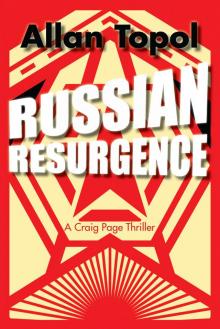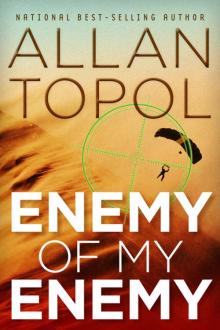- Home
- Allan Topol
Spy Dance
Spy Dance Read online
Spy Dance
A Novel
by
Allan Topol
National Bestselling Author
Published by ePublishing Works!
www.epublishingworks.com
ISBN: 978-1-61417-103-4
Without limiting the rights under copyright(s) reserved above and below, no part of this publication may be reproduced, stored in or introduced into a retrieval system, or transmitted, in any form, or by any means (electronic, mechanical, photocopying, recording, or otherwise) without the prior permission of the copyright owner.
Please Note
This is a work of fiction. Names, characters, places, and incidents either are the product of the author’s imagination or are used fictitiously, and any resemblance to actual persons, living or dead, business establishments, events or locales is entirely coincidental.
The scanning, uploading, and distributing of this book via the internet or via any other means without the permission of the copyright owner is illegal and punishable by law. Please purchase only authorized electronic editions, and do not participate in or encourage electronic piracy of copyrighted materials. Your support of the author’s rights is appreciated.
Copyright © 2001, 2011 by Allan J. Topol
Cover design by Victor Mingovits
eBook design by eBook Prep www.ebookprep.com
Thank You.
"John Grisham and Richard North Patterson may have a new successor in Topol...As entertaining as it is complex, this energetic narrative is loaded with close calls and compelling relationships." ~Publishers Weekly
"Plotwise, Topol is up there with such masters of the labyrinthine, as Robert Ludlum and Tom Clancy."
~Washington Post
By Allan Topol
Fiction
The Fourth of July War
A Woman of Valor
Spy Dance
Dark Ambition
Conspiracy
Enemy of My Enemy
~
Non Fiction
Co-Author of Superfund Law and Procedure
Dedication
This book is dedicated to my wife, Barbara,
who never stopped believing.
Prologue
Dhahran, Saudi Arabia
At ten minutes past midnight, Greg Nielsen stormed into the makeshift wooden building and slammed the door so hard it nearly tore off the hinges. His face was flushed with anger, and his heart was pounding like a drum.
Outside, under a full moon and star-laden sky, a strong wind whipped through the oppressive desert air and swirled the sand into small mounds. Even crickets didn’t venture out into the forbidding atmosphere. Meanwhile, the window air-conditioner chugged and whirred loudly, as it did twenty-four hours a day, fighting a losing battle with the sweltering heat in the middle of August.
Tacked above the entrance to the building was a small sign that said U.S. Agricultural Mission. It fooled no one. The lone sentry on guard confirmed what everyone knew: this building on the outer edge of the huge American military and commercial complex in Dhahran, in the heart of the most productive oil field in the world, was the Saudi Arabian outpost of the Company, as the CIA was euphemistically called.
“Brad and I had a real shouting match,” Nielsen exclaimed to Bill Fox, his assistant. “We almost came to blows.”
Fox was seated at one of the two battered gray metal desks in the large, drab room. He looked up anxiously from a thick pile of computer runs and asked, “Does he know that you’ve been talking to Colonel Azziz?”
“I told him. The time for pussyfooting is over.”
Fox sucked in his breath and blew it out in a whoosh.
“Don’t worry,” Nielsen added. “He doesn’t think you’re in this with me. In fact, he wants the Company to can me as station chief in this hellhole and for you to get my job. So you’ll come out of it smelling like a rose. How do you like that?”
Fox looked guilty but relieved. Ignoring him, Nielsen turned his thoughts back to his meeting in General Chambers’ office. He had refused to be intimidated. He’d learned long ago that military men like Chambers preferred to tell Washington precisely what the President and his advisers wanted to hear.
“Must have been a helluva discussion,” said Fox, staring at Nielsen through heavy black-framed glasses. Only thirty-three, Fox was five years younger than Nielsen, but he looked ten years older. His thinning and prematurely graying hair and an expanding forehead gave him a mousy look.
“Oh, it was. When he gave me the usual shit that ‘the Saudi royal family is America’s great friend and ally,’ I laughed in his face. I told him that they were one of the most corrupt, repressive and autocratic regimes in the world, and that they only supported us if it was in their own self-interest.”
“They also happen to be our largest supplier of foreign oil. It won’t be a great day if people back home turn on a light switch and nothing happens.”
Nielsen smiled. The lack of creative thinking by people like Fox had doomed the Company to its current state of rigor mortis. “Jesus, Bill,” he said. “That’s the whole point: how to maintain a secure source of Saudi oil for the people back home.”
“And you think that dumping the Saudi king is the answer?”
“Wake up and open your eyes. The radical fundamentalists are getting stronger here, as they did in Iran under the Shah. It’s only a question of time until they topple the royal family and seize control. Then they’ll be in a position to cut off our oil spigot.”
“I’m not sure you’re right, and I hate like hell betting all our marbles on Colonel Azziz.”
With his distinctive off-kilter walk, more pronounced now, as it always was when he was tired, Nielsen crossed the room to the small refrigerator. He desperately wanted a cold beer, but he had to settle for a Diet Coke because of the Saudi royal family’s prohibition of alcoholic beverages. He pulled out two cans, tossed one to Fox across the room, snapped open the top on the other and sipped greedily. Then he leaned back in his desk chair and put up his feet, encased in rugged high-cut boots covered with dust. He was still feeling the surge of adrenaline from his argument with General Bradley Chambers, and his deep blue eyes were alert, shining with intensity. He ran his hands through his closely cropped cinnamon brown hair, coated with a layer of windblown sand, thinking about his next move. To preempt Chambers, he’d go to Washington tomorrow. He’d get support from Hugh O’Brien, the Director of the CIA. He’d persuade O’Brien to escalate the issue to the Oval Office.
“Listen, Greg, don’t get pissed,” Fox said hesitantly. “But maybe you should try to see General Chambers again tonight. Figure out a way to make peace with him here before it gets out of hand.”
“The hell with that, Bill.” Greg was a nervous bundle of energy, talking fast and gesticulating, as he did whenever he was excited. “I’ve spent fifteen years of my life trying to safeguard the flow of Middle Eastern oil to the U.S. We lost out in Iraq and Iran, and I’ll be damned if I’ll sit back quietly and watch the same thing happen here. Chambers is dead wrong. It’s not in our national interest to support the Saudi monarchy against Azziz and his fellow officers if they’re planning a coup.”
“You don’t make policy, Greg,” Fox said gingerly. “You’ve been telling them what you think in Langley. So far they’ve refused to take you seriously.”
Nielsen wasn’t listening to Fox. He was deep in thought. “If Chambers does manage to get his way with Washington and have me tossed out of here,” he said, “I think I’ll quit the Company. I’ve had enough. I’ll go someplace and use my computer expertise. Maybe it’s time I worried about myself instead of playing the role of an American patriot.”
“If you’re serious about that, I just might join you,” Fox replied. “Alice called me
tonight. She won’t move here with the kids.” He looked discouraged. “My marriage is going down the tubes faster than a stone in a lake. And I haven’t been laid in months. Hell, I’ll follow you anywhere as long as there are women I can screw without running the risk of getting my nuts chopped off.”
Nielsen still wasn’t listening to his colleague. “I’m not worried about myself. It’s Colonel Azziz. He’s a good man. If Chambers reports to the king on my contacts with Azziz, they’ll kill him in a second.”
“You know what I think?” Fox asked.
Nielsen looked up at his assistant. “What’s that, Bill?”
Fox never had a chance to respond. At that instant a huge explosion erupted outside with an intensity so fierce that it blew the glass out of both windows in the office. Instinctively, Nielsen and Fox hit the concrete floor and rolled under their desks to take cover from flying glass and other debris.
As soon as the room was still, Nielsen bolted up and sprinted for the front door. Fox was right behind. Outside, they saw a huge fireball shooting high into the air about a mile away.
“Jesus,” Fox said, “we were lucky. We got the pressure wave. Not the direct hit.”
“Oh, shit!” Nielsen screamed. “That’s the Khobar housing complex. Let’s move it.”
Quickly, they climbed into a jeep and roared across the dirt road to the housing complex.
* * *
Minutes later, Nielsen pushed through the barriers cordoning off the scene of the bomb blast. He said to an MP, “I’m going inside to pull out people.” Fox was two steps behind his chief.
Together, they worked with rescue units, struggling to bring out the wounded and dead from a twisted eight-story concrete-and-steel structure before portions of it began to collapse. Others tried to put out the half dozen fires that were still raging.
It was risky work in tight quarters. As the rescue effort became more organized, those who were trained to do it urged Nielsen and Fox to stand back and let them do the work. Fox acquiesced but not Nielsen. By now he was wearing a dark green military helmet, which he had found on the floor next to a corporal whose chest had been blown apart. He moved carefully from room to room, not wanting to disturb the constantly shifting debris. He called, “anybody here?” and then listened carefully for muffled sobs or cries for help. He slung bodies over his shoulder and carried them out, moving his lame right leg as fast as he could. All the while he could feel their blood oozing down his neck and arms. His face was soon black from the charred ruins of the building, and his arms ached with weariness.
He picked up a small girl, maybe five years old, in shock. Her right arm had been severed at the elbow, and her glasses had been smashed against her face, bloodying her eyes. He thought about his own sister, Betty, when she had been hit by a car while riding on her bike and had broken her glasses. He could still remember her tiny fingers digging into his neck in terror as he carried her to the hospital.
Outside, he deposited the girl’s limp body with the waiting medics. He found he had tears trickling down his face, and he wiped them away with the dirty sleeve of his shirt. All around him he heard the words “huge bomb in a truck... suicide bomber... just like Oklahoma City... wait’ll we find out who did it... we’ll kill the bastards...”
Nielsen didn’t have to wait to find out who did it. About a month ago, he had infiltrated an Iranian-backed Hezbollah terrorist cell operating in the Shiite region of eastern Saudi Arabia. He had learned that they were planning something big aimed against the American military, on the assumption that the Saudi royal family could remain in power only as long as it had the support of the Americans. If terrorist acts could induce the Americans to leave, as they had in Lebanon and Somalia, the radicals could wrest control from the despised Saudi royal family and establish an Islamic republic that would control the largest oil reserves in the world. Nielsen was never able to find out who the mastermind was behind this operation or when and where the attack would come because his source had not shown up for a meeting last week. Instead, Nielsen had found a small metal box waiting for him at the desert crossroads that had been their meeting point. When he opened it, he found a picture of the man who had been supplying him information and, covered by insects and maggots, what were unmistakably male genitalia.
Taking the information to General Chambers, he had argued for stepped-up defenses at all American military installations. But Chambers had scoffed at his warning.
The sun was starting to rise quickly in the eastern sky, bringing with it the blazing desert heat. It was only five-fifteen, and yet Nielsen felt he was in a furnace as he gently carried a pregnant woman with burns on most of her body.
He was on the verge of collapse from exhaustion, but he made himself move back toward the devastated building. “One more time,” he told himself. “Do it one more time.”
This was precisely what he had told himself on the last five trips. As he started toward the building, he felt a tug on his arm. He wheeled around to face Major George Hawkins, one of General Chambers’ aides.
“The general wants to see you,” said Hawkins.
“Later. Tell him I’m busy saving lives.”
“General Chambers said ‘on the double,’ Mr. Nielsen.”
“Fuck him. This is more important.”
“Others will do the rescue work.” Hawkins pointed at the rescue party, which had grown. Television trucks and cameras had arrived on the scene with their ubiquitous microphones shoved in front of anyone who would make a statement.
Nielsen knew there was no point arguing with Hawkins. In weary resignation he followed the major across the Dhahran complex to a building that had remained intact. It was the base headquarters, which had been built to withstand anything except a direct attack.
They rode the elevator to the third floor, where Major Hawkins deposited Nielsen in a large conference room. Standing alone with his back to the door, the general was studying a map on the wall, while puffing on a large cigar. The air-conditioned room was such a contrast to the outdoors that goose bumps erupted on Nielsen’s skin. Unobtrusively, the major exited and pulled the door shut behind him.
As if the sound of the closing door was a cue, the general mashed the cigar under his boot and whirled around. He gave Nielsen a cold stare of contempt. The rows of medals on his tan army jacket sparkled in the sunlight pouring through the windows.
“Are you proud of yourself, mister?” Chambers barked in his booming loud voice. His western North Carolina accent had an icy edge.
“What are you talking about?”
“Thanks to you, Azziz and his ga’damn buddies managed to kill more than a hundred Americans tonight. With over two thousand Americans living in that complex, it’s a ga’ damn miracle the casualties weren’t ten times that amount.”
Nielsen felt the anger rising in his body. “Azziz had nothing to do with that bomb.”
With his jaw firmly set, Chambers moved in close to Nielsen. “How much did you tell Azziz about our defenses here at Dhahran?”
“What are you talking about?”
“All the times you met with him. You must have told him plenty about our defenses.”
Nielsen was incredulous but also wary. Chambers was a snake. Nielsen understood what he was doing: trying to set up a scapegoat for his own failure to maintain adequate security at the base.
“Not one fucking word,” Nielsen replied, raising his voice. “The subject never came up. If I wanted to help someone strike a blow against the royal family, I sure wouldn’t do it by killing Americans. Hell, I was the one who developed the computer systems that govern security at the king’s palace and in the oil fields. All I’d have to do is give those computer programs to the dissidents. They would have the keys to the palace, for chrissake.”
“I’m asking you one more time. What did you tell Azziz about our defenses?”
“And I’m telling you, nothing.”
“I’d like to ask Azziz, but as soon as the bomb went off here, I told
the king about his relationship with you. I was promised that his head would be on display in Riyadh by noon today.”
Nielsen gave a low curse. “You bastard.”
“They wanted you, too. But I said you were ours. I’m shipping you back home to stand trial before a military court as an accessory to the murder of the over one hundred Americans, who were killed here today.”
Nielsen could hardly believe his ears. “You’re what?”
Chambers repeated what he’d said. Then he pointed at a wooden chair next to the conference table. “Sit down, mister,” he ordered Nielsen. “I’m going out to get a couple of MPs to arrest you.”
“Like hell you are,” Nielsen shot back. He strode swiftly toward the door.
Moving to cut him off, the general stationed himself ten feet in front of the door. He was powerfully built, two hundred and twenty pounds and a couple of inches above six feet. With a barrel chest and powerful arms, he’d always reminded Nielsen of a tank. At the age of fifty, Chambers, a former champion wrestler at West Point, was still in great shape.
“I gave you an order, mister,” the general barked. “Go back and sit down.”
“Fuck you. I’m not under your command.”
“It’s a military zone, mister. Everybody’s under my command.”
Nielsen feinted to the left and then moved sharply to the right, hoping to get around Chambers. He was halfway to the door when Chambers grabbed his left arm and twisted it behind his back. “Let go of me,” Nielsen cried out. He couldn’t break free.
Chambers slammed him against the wall and kept applying pressure to his arm. When Nielsen struggled, Chambers used his fifty pound weight advantage to keep him pinned against the wall.

 Conspiracy
Conspiracy Spy Dance
Spy Dance The Argentine Triangle: A Craig Page Thriller
The Argentine Triangle: A Craig Page Thriller Russian Resurgence
Russian Resurgence Enemy of My Enemy
Enemy of My Enemy The Washington Lawyer
The Washington Lawyer THE SPANISH REVENGE (Craig Page series)
THE SPANISH REVENGE (Craig Page series) The Italian Divide
The Italian Divide The Russian Endgame
The Russian Endgame Dark Ambition
Dark Ambition